
REMEMBERING THE EXCELSIOR, BETHNAL GREEN
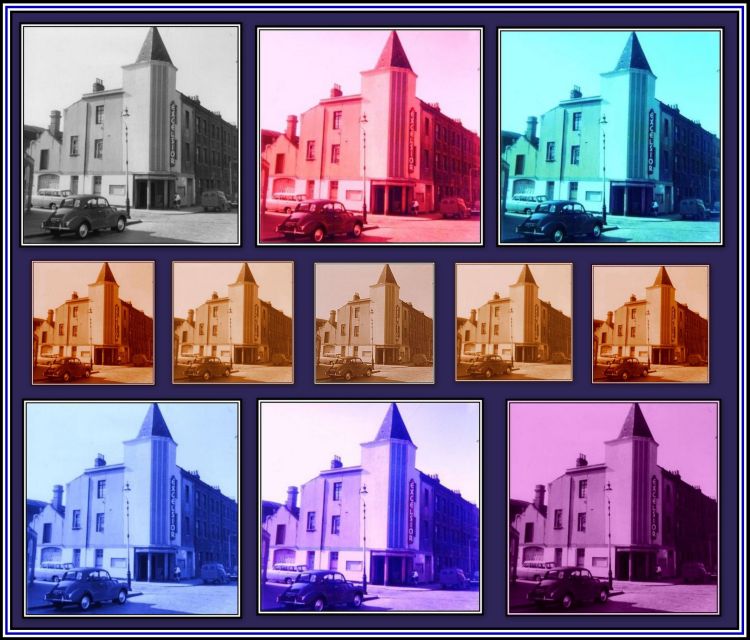 |
| |
|
| |
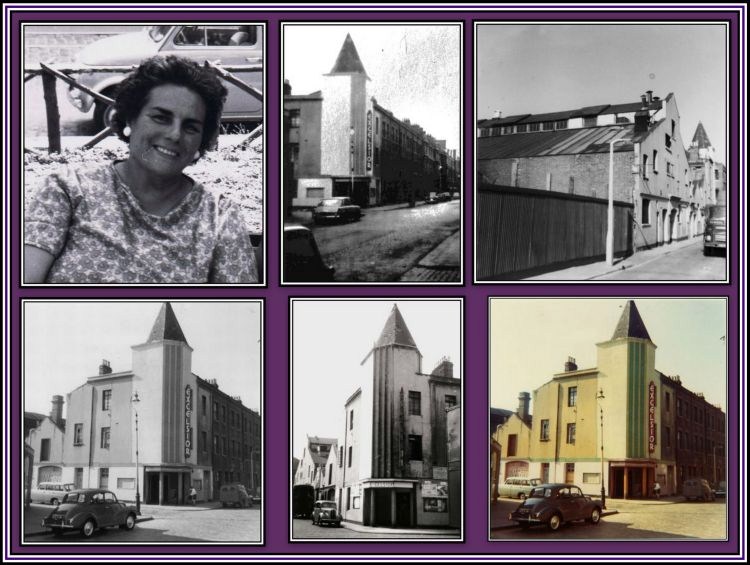 |
| |
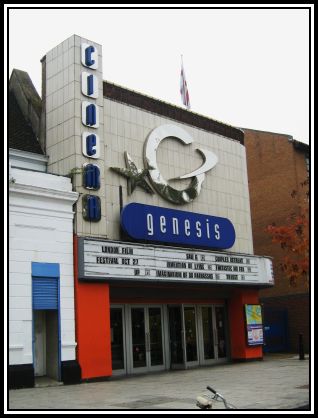
There was never any question about it, the Excelsior was my mother’s favourite cinema. Not only was it her favourite cinema, it was probably her favourite place to go for entertainment. As much as she enjoyed going to the Hackney Empire or to a theatre in the West End or to the cinema, I suspect – no, I know – that were she given a choice, she would have chosen to go to the Excelsior.
It may seem odd that an old cinema in the heart of Bethnal Green in the East End of London that was once a swimming pool and lecture hall held such a special place in my mother’s heart. The reader may think that there was something special about the building that would explain her liking the place so much. Surely it must have been a great Picture Palace with magnificent architecture and décor? Perhaps it offered a glamorous, never-to-be-forgotten night out? Alas, it was for none of these reasons that caused the cinema to captivate her so.
To be honest, the Excelsior was a small and oddly shaped building that most passers-by might not have given a second glance unless of course they knew that it was a building once renovated and modified by the great theatre architect, Frank Matcham. However compared to many of his masterpieces, such as the Hackney Empire, the Victoria Palace and the London Palladium, to name but a few, the Excelsior was but a lowly cinema that did not appear to bear his unique stamp. Although my mother liked its exterior design and the cosy feeling inherent to the auditorium, it was not the just these points that caused her to love the place so much. Her love of the Excelsior went beyond the superficial. |
| |
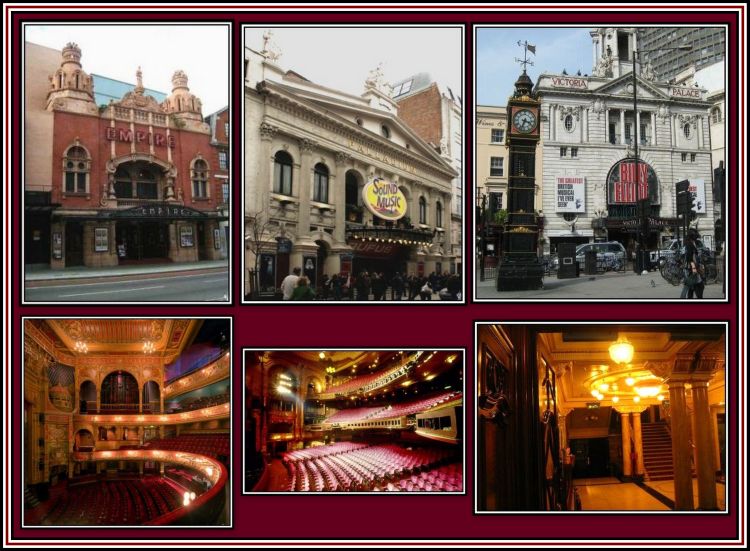 |
| |
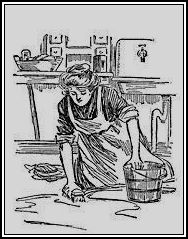 My mother had a difficult childhood and suffered much abuse at the hands of her mother and stepfather. She was treated as a virtual slave and used to tend to the needs of the endless number of children that my grandmother and her second husband produced. When she was not caring for her siblings, she was sent out to find house cleaning jobs. My mother spent so much time on her knees while cleaning the houses along the Hackney Road that she wore away her kneecaps. In later life, when in hospital in Chapel Hill, North Carolina, an endless stream of medical students came to her room to examine the lady without kneecaps. Apparently none of the attending physicians and students knew that excessive kneeling during childhood can wear away the cartilaginous kneecaps before they are ossified. My mother had a difficult childhood and suffered much abuse at the hands of her mother and stepfather. She was treated as a virtual slave and used to tend to the needs of the endless number of children that my grandmother and her second husband produced. When she was not caring for her siblings, she was sent out to find house cleaning jobs. My mother spent so much time on her knees while cleaning the houses along the Hackney Road that she wore away her kneecaps. In later life, when in hospital in Chapel Hill, North Carolina, an endless stream of medical students came to her room to examine the lady without kneecaps. Apparently none of the attending physicians and students knew that excessive kneeling during childhood can wear away the cartilaginous kneecaps before they are ossified.
My mother knew little kindness in her early life. Those that cared for her died early in her childhood. Her father was killed during World War I and her grandfather died soon after. Her life was not filled with things that other children of her age enjoyed. She was never given any money for sweets or to go to the pictures. She never had time to play games with other kids as her life was one of endless drudgery. She was forced to leave school at eleven years of age in order to take on these activities in a full-time capacity.
The Excelsior became a special place to my mother on an afternoon, sometime in the 1920’s. It was then that she stepped foot inside the building for the first time. And it was the memory of the kindness shown to here during this visit that caused her to hold it in such high regard.
On that afternoon, a charitable group organized a party for the children of Bethnal Green whose fathers had been killed during World War I. The numbers included my mother and her two brothers, Alfred and Edward. She told me that she was thrilled to be invited, as she had never been to a party before. Indeed, other than her grandfather’s home, she had never been invited anywhere.
Apparently the invited children were escorted to the Excelsior by their teachers. My mother had often seen the Excelsior from the outside, but had never been inside. She told me that she was very excited at the thought of entering the building. Once inside they were taken into a great hall where she saw a number of long tables covered with white tablecloths. On the tables were a number of plates of sandwiches and cakes that had been set out for them to eat. My mother said that she could not believe the amount of food on the table and had never seen so much in one place before. Her grandfather used to buy his grandchildren cakes, but since his death, she had not eaten any. She also told me that on that day she ate jelly and drank fizzy lemonade the first time. She remembered being given a blue paper hat to wear, which she folded up neatly and took home after the feast. My mother said that the children were allowed to eat as much as they liked and the servers were not grumpy, but kind and showed tenderness to the poor children present. She told me that she had never experienced anything comparable in her life at that time. Once everyone had eaten their fill, the Mayor of Bethnal Green gave a little speech and then each child received a present. Needless to say my mother was not in the habit of getting presents on either her birthday or at Christmas. Whenever she did hang up a stocking on Christmas Eve, the only things she found in it were a rotting discarded apple and a piece of coal. |
| |
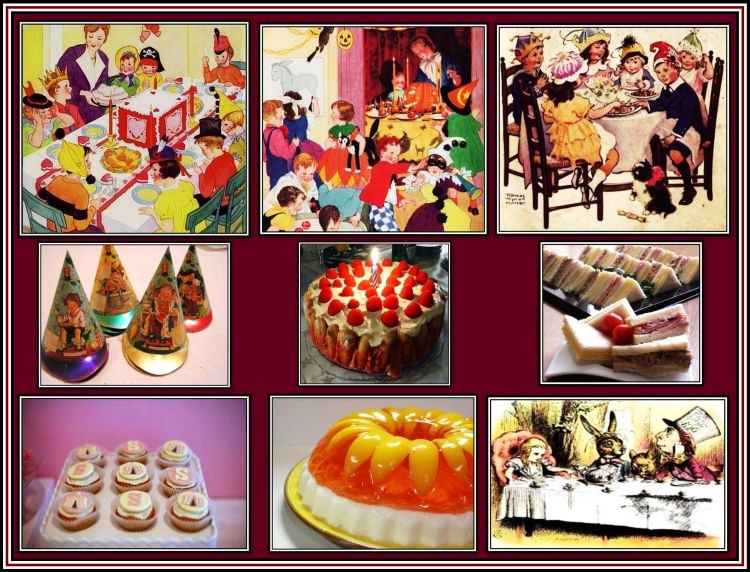 |
| |
My mother thought the Excelsior the most beautiful place that she had ever seen. She said that she believed it to be a palace since she noticed golden decorations on the walls and a huge velvet curtain at the far end of the hall. Undoubtedly, the Excelsior was the most glamorous place that she had ever seen,but more importantly, it was here that she was shown kindness, something that had been absent from her life for some time.
Sadly, once my mother and her brothers returned home from their afternoon out, her stepfather took their presents from them and gave them to his own children. Next he proceeded to beat her and her elder brother for no apparent reason, and once done, told them to get out and look for work since he was without money and needed some to spend in the local public house that evening.
Whenever my mother went to the Excelsior, she liked to sit in the seat at the corner where the transverse central and right longitudinal aisles met. Sitting here allowed her to avoid standing up when patrons passed by and also allowed her to stretch out her legs in comfort. Seated in her preferred seat, she was able sit back, relax and enjoy the programme offered, which consisted of the main film, a supporting film, the Newsreel and next week’s coming attractions. To add to her pleasure, during the interval, she enjoyed a vanilla Walls Ice Cream between two wafers. |
| |
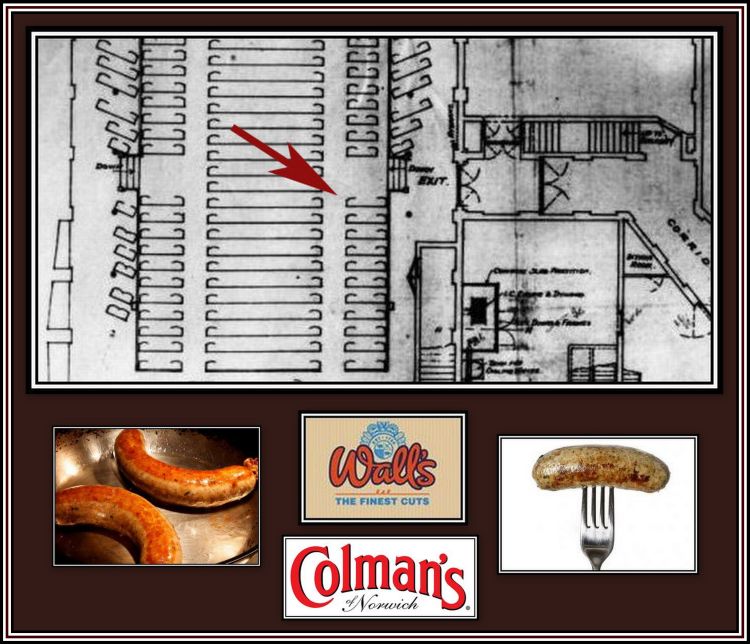 |
My Mother's Preferred Seat as indicated by the Red Arrow |
| |
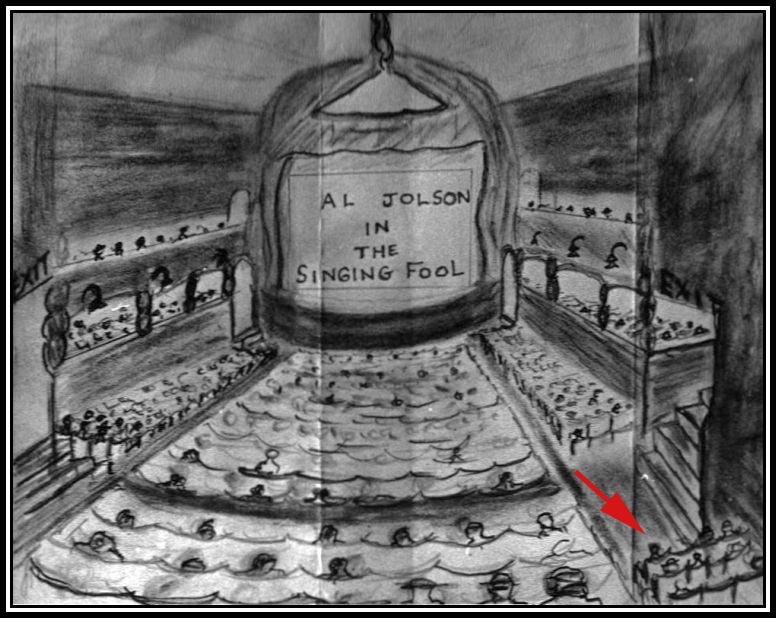 |
Excelsior Auditorium drawn by a local resident |
| |
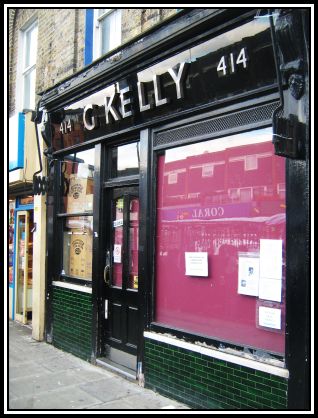 There was one thing that my mother did not enjoy at the Excelsior and this was the advertisements. The cinema showed a collection put together by the Pearl & Dean Company. Most times there was an advertisement for Walls Sausages,which brought her much displeasure. Here a number of half-cooked sausages were seen sizzling in a frying pan. This image never failed to cause my mother to complain that whenever she saw those sausages cooking in the pan, she invariably felt hungry. I have to confess that the sight of those golden brown sausages and my mother’s remarks caused me to feel hungry too. Although this advertisement never failed to have a profound effect on us, I am sure that we both forgot about our rumbling stomachs once the film began. However when the main film was over or once it got to the point where we had come into the cinema, her pangs of hunger returned with a vengeance and we left the cinema very quickly and made our way out into the night, along Mansfield Street and across the Bethnal Green Road to Kelly’s, a pie ‘n’ mash shop. There was one thing that my mother did not enjoy at the Excelsior and this was the advertisements. The cinema showed a collection put together by the Pearl & Dean Company. Most times there was an advertisement for Walls Sausages,which brought her much displeasure. Here a number of half-cooked sausages were seen sizzling in a frying pan. This image never failed to cause my mother to complain that whenever she saw those sausages cooking in the pan, she invariably felt hungry. I have to confess that the sight of those golden brown sausages and my mother’s remarks caused me to feel hungry too. Although this advertisement never failed to have a profound effect on us, I am sure that we both forgot about our rumbling stomachs once the film began. However when the main film was over or once it got to the point where we had come into the cinema, her pangs of hunger returned with a vengeance and we left the cinema very quickly and made our way out into the night, along Mansfield Street and across the Bethnal Green Road to Kelly’s, a pie ‘n’ mash shop. |
| |
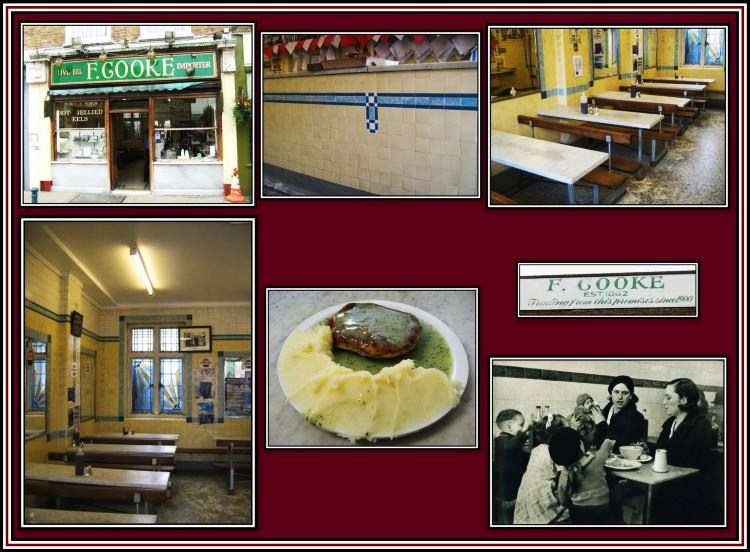 |
| |
| On such evenings, my mother bought three meat pies and had them extra-wrapped so that they did not lose their heat during the walk home. At the time, we lived only a few steps down the Bethnal Green Road just across from the Salmon & Ball public house in Paradise Row. So there was little risk that the pies would actually get cold before we got there. Once home, we quickly took off our coats and I would get two plates, two knives and two forks and bring them to the table. My mother now opened our parcel and placed one pie on my plate and two on hers. She then cut one of her pies in two and moved one half to my plate. I was always known to have a good appetite and ate very much like an adult from a young age. While eating our pies, my mother would always say that although these pies weren’t prepared by my father, who was a pie maker par excellence, they weren’t bad. In fact I remember them as being delicious, but then I was easily pleased as a child. Soon our plates were clean and those sausages were long since forgotten. Eating meat pies was the perfect ending to a perfect evening. |
| |
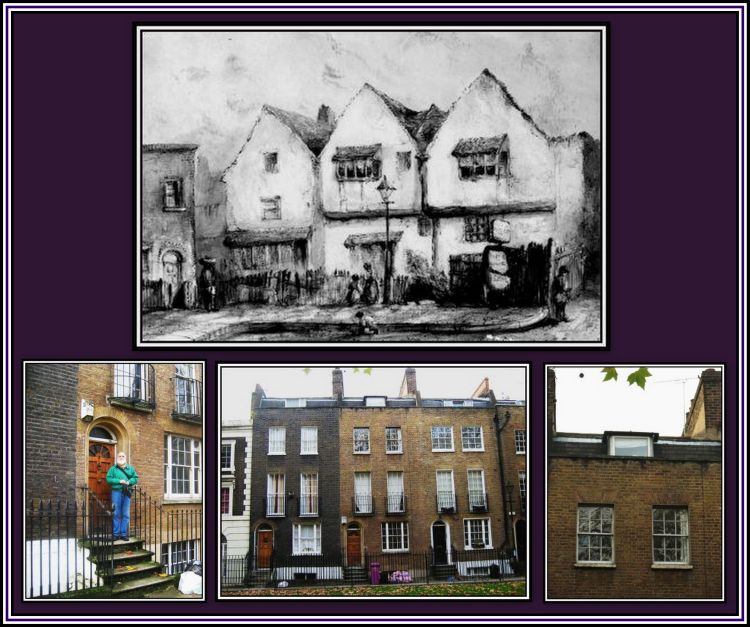 |
Paradise Row, Bethnal Green in the mid-nineteeth century and in 2009 |
| |
As a child, we lived above the pie ‘n’ mash shop that my parents ran on Cambridge Heath Road at The Mile End Gate. Their workdays were both long and hard. They opened for lunch each day from 11 a.m. until 3 p.m. and later each evening, except Thursdays, from 5 p.m. until 11 p.m. for dinner and supper. Thursday evenings were set aside for family outings. We would either go to the cinema or to the Hackney Empire or to a theatre in the West End. Whenever we went to the cinema, we would generally go to the ABC Mile End to see the latest Hollywood Musical. However, we would occasionally go to the Excelsior. I loved going out with my parents or just with my mother and, whenever we went to the cinema, I did not care which one we went to or what film we saw. I liked them all, and on those rare occasions when I didn’t, I was always at liberty to snuggle down in my seat and go to sleep. However, as I got older, my tastes in film became less eclectic with the result that I became less enamoured of the films shown at the Excelsior. This situation came to a head once CinemaScope was introduced. |
| |
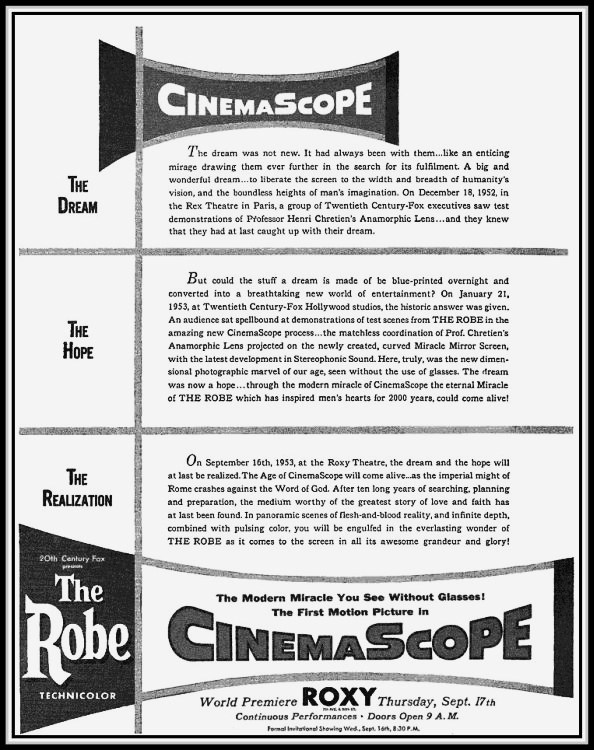 |
| |
| Once it was introduced, I became totally enthralled by the process and greatly impressed by the spectacular epic films being produced by 20th Century Fox. Who could resist a spectacle filmed in glorious Technicolor and photographed in a magical process that allowed images to stand out without the use of special glasses? These films were screened at the Essoldo, which was but a few yards further along the Bethnal Green Road from the Excelsior. My mother was less than charmed by this incredible advancement in film and failed to appreciate its importance. In addition, she held the Essoldo in low esteem. She said that the seats were in a poor state of repair and extremely uncomfortable. In addition, she believed the cinema to be badly maintained and in need of a good cleaning. In retrospect, my mother was quite correct in her assessment of the Essoldo, as the place was certainly nowhere near as comfortable and clean as the Excelsior. However being blinded by the grandeur of CinemaScope and spectacle, I was in mood to agree. |
| |
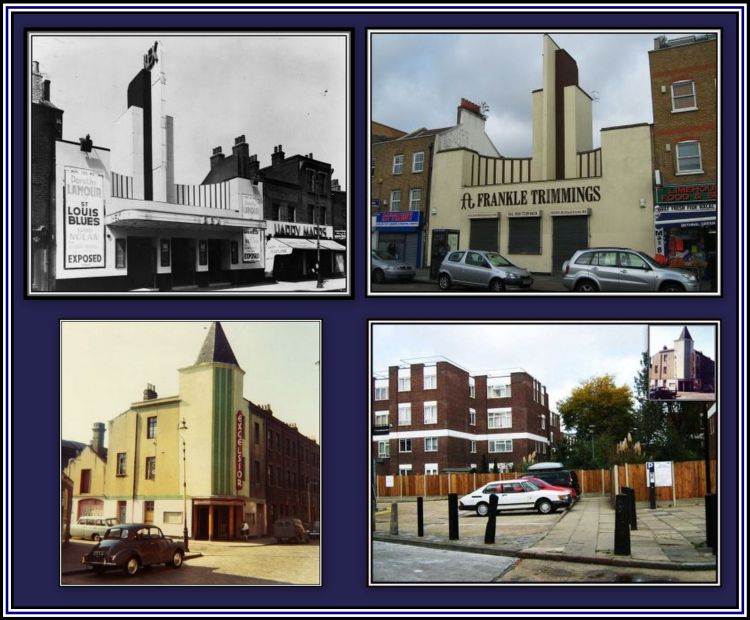 |
| |
From this time on, whenever I went to the pictures with my mother, and there was something spectacular showing at the Essoldo, we took to debating whether to go to the Excelsior or the Essoldo. As often as not, I found myself loosing the debate and being taken to the Excelsior. It did not take me long to realize that if I were to have any hope of going to the Essoldo on a regular basis, I had to develop a more cunning approach to my argument.
Convincing my mother to forego a trip to the Excelsior proved difficult. Old habits are hard to break. For her, the Excelsior represented a certain luxury while the Essoldo totally lacked charm. However, after careful thought I am sorry to say that I soon developed a certain adeptness at deception and was able to convince her on occasion to forego a trip to the Excelsior in place of one to the Essoldo. I achieved my goal by telling her a series of lies. One lie was to tell her that one of her favourite actors, either James Cagney or George Raft, had a role in the film currently playing at the Essoldo. Mentioning this in passing was sufficient to interest her and soon we were crossing Mansford Street and bypassing the Excelsior. Naturally I did not overuse this deception since once the film ended I had to come up with a reason for the absence of her favourite in the film. Here, I usually pretended to be as upset as she about the failure of a favourite to appear and blamed the newspaper advertisement for giving us false information. Other times, when a film was showing with a historic setting, I told her that my teacher recommended that we see the film, since she considered it vital for the furthering of my education. This always worked well since my mother considered education to be of prime importance. Other reasons were given when necessary and so I was able to achieve my goal most times. These deceptions soon became superfluous, as I took to leaving school early and quietly slipping into the Essoldo on Monday afternoons on my own or with classmates. In this way I believed that both my mother and I got what we wanted. |
| |
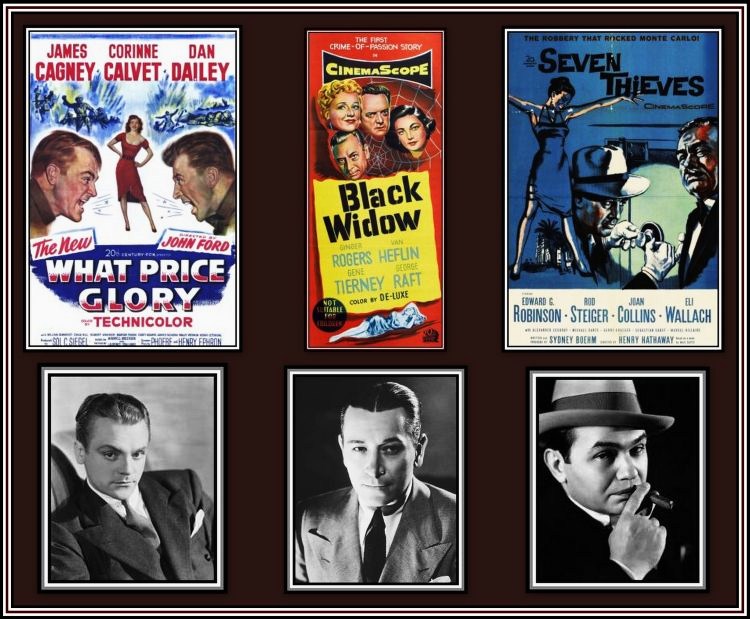 |
| |
| Naturally I regret my deception and lies however such are the things that kids do to get their own way. I also regret my attitude towards the Excelsior. In those days, I was never overly fond of the place. It was fine, in its way, but at the time, it did not hold the memories that it did for my mother. I judged the cinema on what films were shown there, and besides, its screen was very small, and even when a film was advertised as being made in CinemaScope, it was painfully obvious to anyone that it certainly was not being shown in true CinemaScope format (2.55:1 or 2.33:1 Aspect Ratio) and that the images lacked that crispness that only films shown through an anamorphic lens could achieve. |
| |
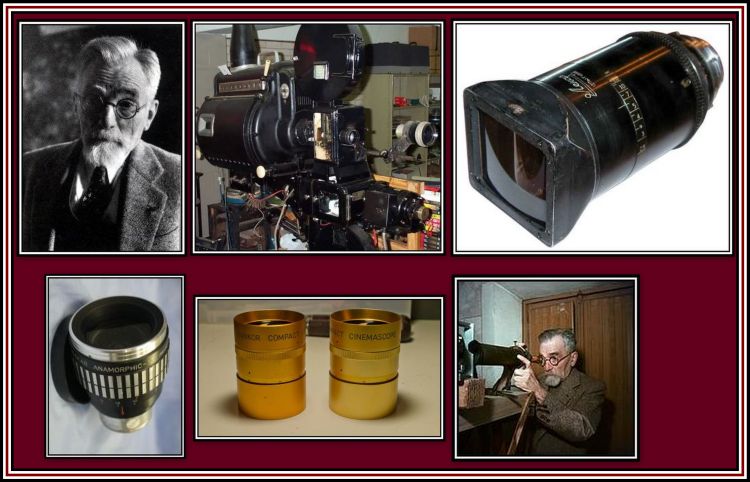 |
Henri Chretian (1879-1956), astronomer and inventor, who developed the anamorphic lens |
| |
| When I knew the Excelsior, it generally screened films shown on the Gaumont circuit most of the time. This meant films produced by Paramount, Universal and J. Arthur Rank. Paramount did not produce films in CinemaScope. The company developed its own widescreen process, VistaVision, which did not impress me at all at the time. With time, I was to realize that this process was perhaps superior to CinemaScope, although the films produced by Paramount had nowhere near the excitement of those of 20th Century Fox at the time. |
| |
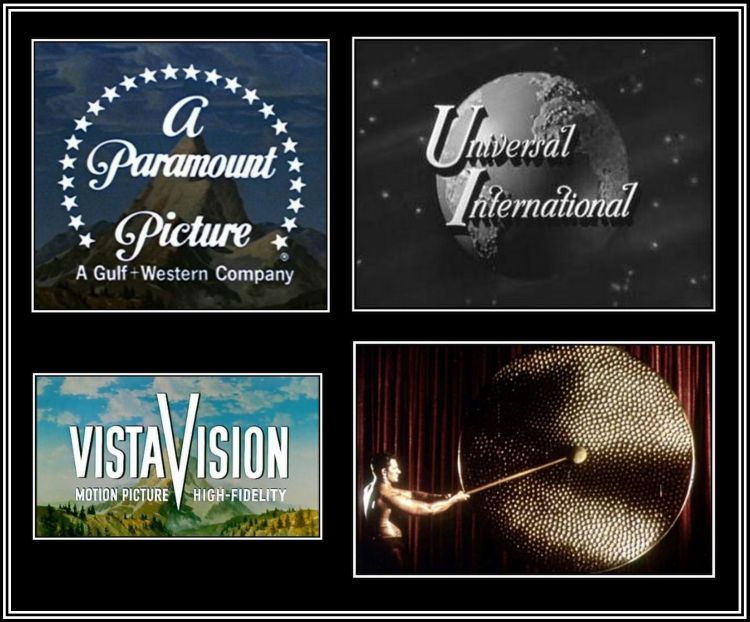 |
| |
| Universal was not the huge company that it is today. Although the studio had expanded during the 1950s and was beginning to gather a larger number of popular stars, as far as I was concerned their stable remained nowhere near as good as those of other studios. It has to be remembered that at this time, I was interested only in films set in the times of the Arabian Nights, westerns, as long as there were lots of Indians, and pirates. Like most kids, I enjoyed sword fighting and jousting along with the circling of wagons and the firing of flaming arrows. It is still my secret wish to join a Sioux raiding party and gallop across the Central Plains creating havoc wherever we go. |
| |
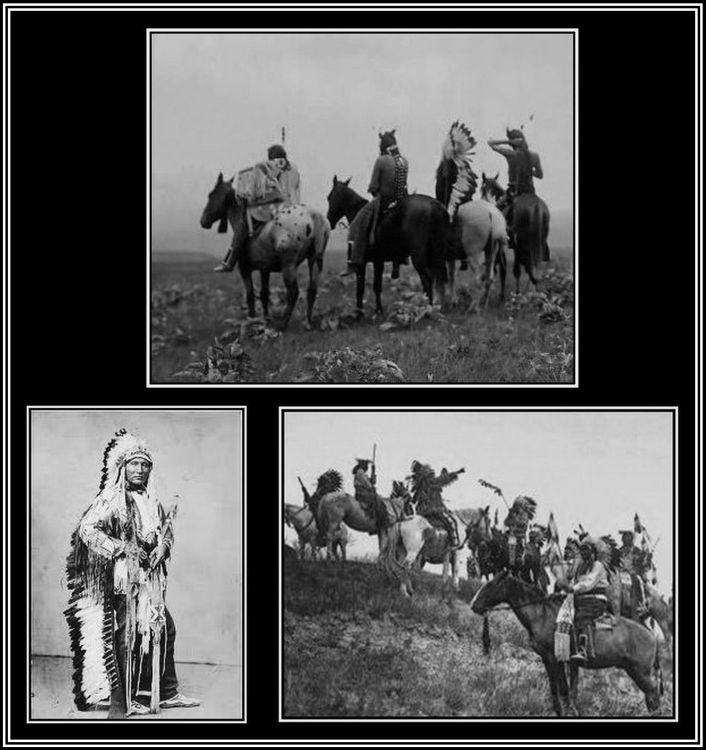 |
| |
| Being an independent cinema, the Excelsior was not required to show Gaumont films each week. I recall one visit to the Excelsior that caused me much grief at the time. Sometime in 1955, the film, Sitting Bull, was showcased in the West End of London. Immediately I began to look forward to seeing this film. It was one not to be missed. Once the film went into General Release, it began to be shown in all of the Gaumonts of North West London. Naturally I assumed that I would be able to see the film the following week at the Excelsior, since the cinema was part of the Gaumont North-East London circuit. I remember walking along the Bethnal Green Road with my parents and turning into Mansfield Street and then looking up at the advertisement board set on the second floor of the building on the corner. The board normally announced the weekly showings at the cinema. I was horrified at what I saw. Where I hoped to see a picture of Sitting Bull staring back of me was an advertisement heralding a completely different film. The advertisement stated that the cinema was proud to present John Wayne and Gail Russell in The Angel and the Badman. No Indians! |
| |
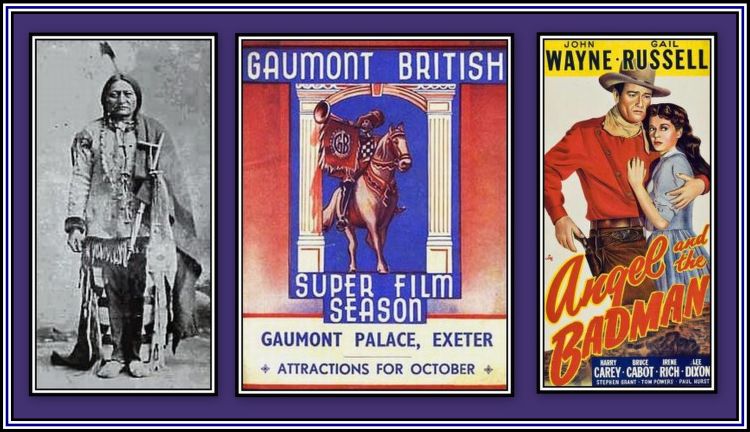 |
| |
It was too late to convince my mother to go to the Essoldo, and with much regret and a lot of sulking on my part, we went to the Excelsior. Needless to say, I did not enjoy the film at all and dismissed it as dull. It was only after a number of years that finally I was able to see Sitting Bull. It was to be screened by the television channel, Turner Classic Movies, here in the U.S., on a Sunday evening. I spent the day willing time to pass quickly. Eventually after surrounding myself with a variety of tasty sweetmeats and other assorted delicacies along with suitable drinks, I at last sat in my chair after having disconnecting the telephone and sat and waited to enjoy the film. The film was introduced and almost immediately as the opening credits rolled I realized that this film was not going to live up to my expectations and sadly it proved to be one of the worst films that I had ever seen. It was badly produced with a storyline that was confused. Amusingly not long after, I was able to re-see The Angel and the Badman. Evidently, and thankfully, tastes change with time. Although The Angel and the Badman cannot be described as one of John Wayne’s better films, upon re-viewing it proved nowhere near as bad as I remembered it. It certainly was a lot better than Sitting Bull. Mind you, I doubt if I would have believed this as a child.
My mother liked most films shown at the Excelsior except War films. She said that she had had enough war in her life having lived through the London Blitz of World War II. She also was not overly fond of any film where Richard Attenborough had a role. In the early 1950s, he was not a star and was typecast in his supporting roles. I remember him playing cowards or weaklings. He always seemed to be the sailor that cracked under pressure or else the soldier who went to pieces in a trench. It took me years to appreciate his acting ability and I, for one, was glad when he turned to directing, where he was much better. I have to admit that his role in the original production of Brighton Rock was suitably chilling and clearly demonstrated his potential as an actor. |
| |
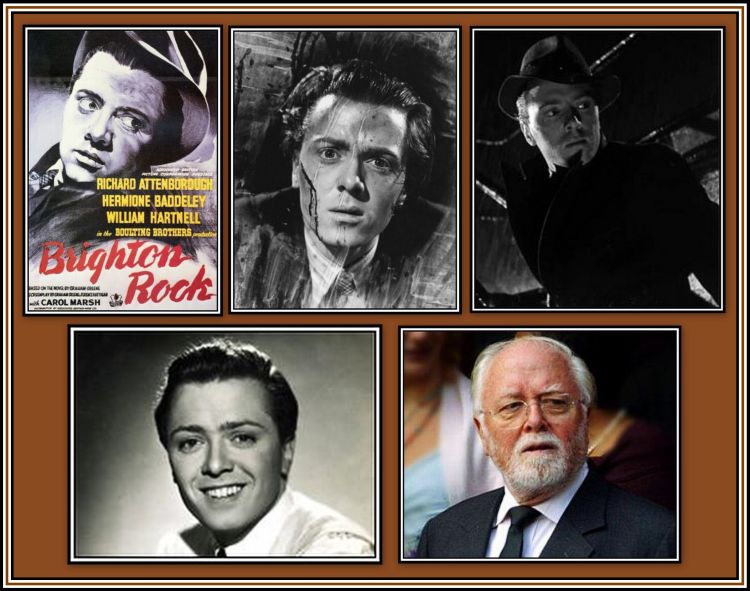 |
| |
| During our visits to the Excelsior, Universal was enjoying success with films produced by Ross Hunter and directed by Douglas Sirk. These films were glossy and expensive tearjerkers. Today they would be called two or three handkerchief movies, women’s pictures or perhaps the most insulting term of all, chick-flicks. In these films, the women were both beautiful and elegantly dressed and the men handsome. At the time, the actor and actress most loved by the audiences were Rock Hudson and Jane Wyman. Together they made two films that were very successful at the box office and still shown with regularity on television today. The first was Magnificent Obsession, which was so well received that the stars were brought back together for All that Heaven Allows. |
| |
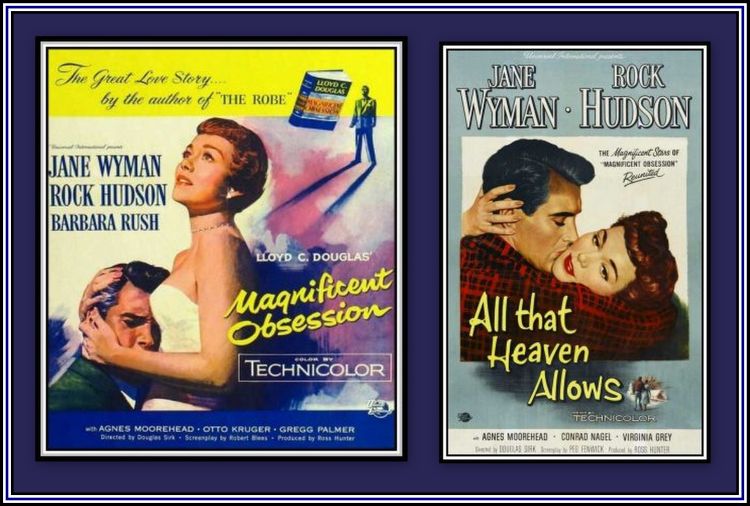 |
| |
I recall very well seeing Magnificent Obsession at the Excelsior. My mother was seated in her favourite seat with me next to her and my father on my right. While I finished my ice cream, latecomers were finding their seats and getting comfortable before the film began. Sadly the Excelsior had no house organ, which I felt was unfortunate. However I did find the choice of music played during the brief interval before the main film to be very appealing. Obviously most of the audience agreed, as many of them would whistle along with Les Paul’s rendition of Mocking Bird Hill, which was often played. When it wasn’t, another piece by Les Paul & Mary Ford took its place and was equally appreciated. It amazes me that whenever I hear this duo, I am immediately transported back to my visits to the Excelsior.
I remember being filled with the usual excitement as the houselights dimmed. As the curtains slowly parted, there on the screen was the huge revolving globe that announced that we were to be treated to a film produced by Universal Pictures. As the globe turned and the credits changed, the auditorium became filled with music that set the scene for what was about to follow. My mother was a tender hearted woman. She wept when she learned that children were being badly treated and when someone became ill or got hurt through no fault of their own. Magnificent Obsession was a film tailor-made to appeal to her and allowed her to silently weep during a number of scenes. The storyline had been written with the specific intention to tug at the heartstrings and only those without feeling were immune to its affect. The soundtrack music played an important role in creating a mood conducive to the flowing of tears. Although my father did not seem to dislike the film, unfortunately he offered no comment of note when it was over. It was unfortunate that he had been unable or unwilling to express a suitable opinion on the film. Although my parents had been married for a number of years, they obviously had not become habituated to their differences. My father’s apparent lack of response to the film caused my mother to half-jokingly accuse him of having no feeling. Had my father blown his nose or perhaps wiped an eye with his handkerchief, he could have avoided her critique and her accusation. But, alas no, he just stood there and allowed her remarks to simply wash over him. I have to confess at not being overly impressed with the film at the time, but then this was not surprising given my age. In order not to risk being tarred with the same brush as my father, for once I did not voice my opinion. |
| |
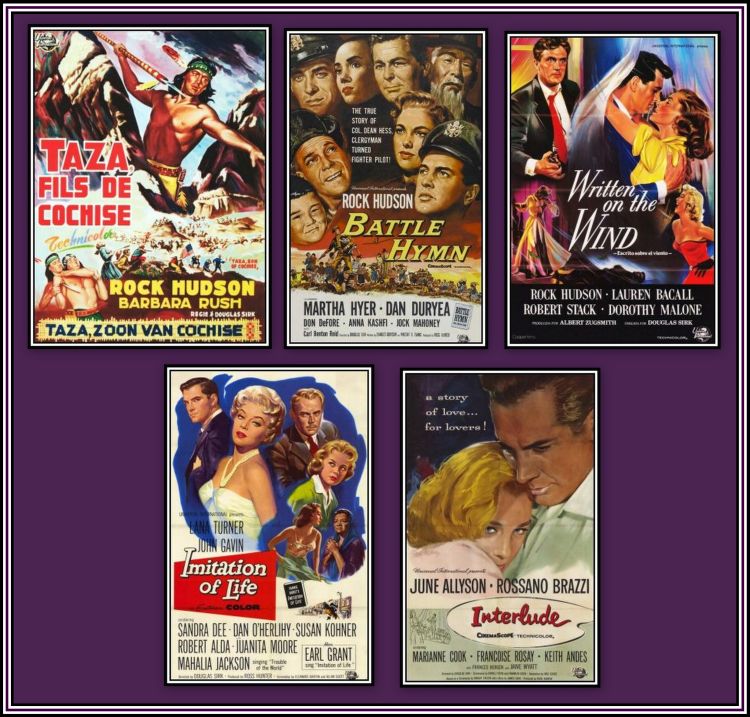 |
Other films directed by Douglas Sirk |
Click on a poster to see the clips from the films |
| |
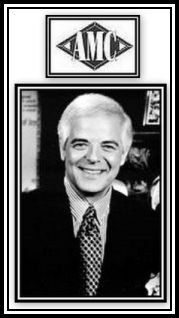 My mother moved to Chapel Hill, N.C. in 1992 and proved to be a very easy person to share my home with. Once we settled into a routine, Saturday afternoons became a time for us to sit down and watch or re-watch a film that had been shown at the Excelsior. These Excelsior films were shown on the American Movie Classics channel and were generally introduced by Nick Clooney, the father of actor George Clooney. Perhaps the film that gave my mother the most pleasure to see was Magnificent Obsession. As time passed, sadly – or perhaps happily – my mother became more and more forgetful and so was able to re-see this film and others and believe that she was seeing them for the first time. Regardless of having now seen Magnificent Obsession multiple times and being able to recite most of its dialogue from memory, the film holds a special place in my memory since it gave my mother such pleasure. My mother moved to Chapel Hill, N.C. in 1992 and proved to be a very easy person to share my home with. Once we settled into a routine, Saturday afternoons became a time for us to sit down and watch or re-watch a film that had been shown at the Excelsior. These Excelsior films were shown on the American Movie Classics channel and were generally introduced by Nick Clooney, the father of actor George Clooney. Perhaps the film that gave my mother the most pleasure to see was Magnificent Obsession. As time passed, sadly – or perhaps happily – my mother became more and more forgetful and so was able to re-see this film and others and believe that she was seeing them for the first time. Regardless of having now seen Magnificent Obsession multiple times and being able to recite most of its dialogue from memory, the film holds a special place in my memory since it gave my mother such pleasure.
The films that I enjoyed at the Excelsior were mostly period films. I especially liked The Black Shield of Falworth and Houdini. I also liked those produced by Universal and set in Iraq or Persia starring Jon Hall and Maria Montez. Later their places were taken by Tony Curtis and Piper Laurie. These films were made on Hollywood sets, but they looked remarkably realistic and exotic to me at the time. Each film basically followed the same plotline. The son of a Caliph or some such ruler had to go into hiding as a child when his father was killed and his birthright stolen by a wicked minister or relative. The remainder of the film dealt with his regaining his throne and winning the girl, either a helpful slave girl or a beautiful princess. These films were filled with lots of action and ended with an enormous battle in a palace. I suspect that the audience was generally unable to distinguish the goodies from the baddies during this free-for-all, but it always ended when the hero and the villain fought it out and ended with the hero plunging a curved dagger into the villain, whereupon his army immediately surrendered. Each film would end in exactly the same manner with the hero and the slave girl now elevated to princess statue dressed in finery coming together in a kiss that suggested that they lived happily ever after. |
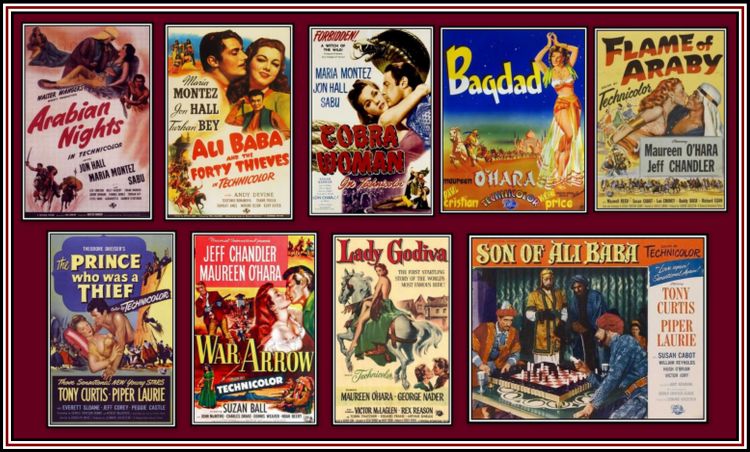 |
| |
These films of The Arabian Nights contained something for everyone in the audience: lots of action for the kids, glamorous dancing girls for the fathers, and for the mothers, glorious sets, fabulous clothes and handsome leading men. No one noticed the dialogue or the accents of the actors. In one film, Tony Curtis with a thick Bronx accent was required to say, Yon’er lies the cas’le of my fadder! Hardly Shakespeare, but great stuff anyway.
It was at the Excelsior that I saw my first film starring Audrey Hepburn. This was not her first Hollywood film, which was Roman Holiday, but her second, Sabrina Fair, as it was called in Britain. The film was directed by Billy Wilder and also starred William Holden and Humphrey Bogart. I was not overly impressed except that I did find her attractive, if a bit thin for my taste. |
| |
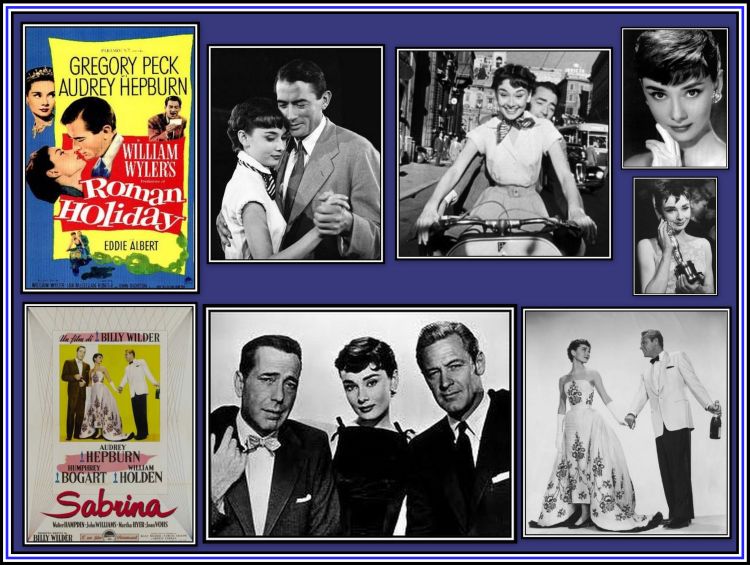 |
| |
It was also at the Excelsior that I saw my first foreign language film. The film was the French film Ali Baba with the wonderful Fernandel. It was not the policy of cinemas showing films on General Release to screen films in any other language other than English at that time. I remember seeing only one other film in French as a child and this was at the Odeon Hackney Road. At that time Foreign films were shown at select cinemas in the West End and it would be some time before I started seeing them with any regularity.
Ali Baba proved to be an immensely entertaining film once I got used to reading the subtitles and, as a result, Fernandel became a firm favourite with me.
|
| |
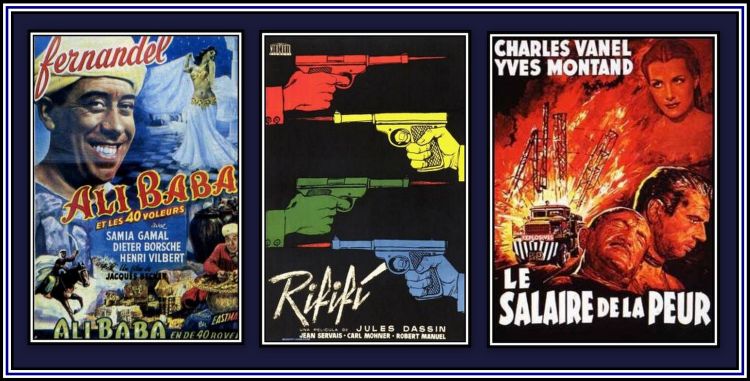 |
| |
| The worst film that I ever saw at the Excelsior was seen from the balcony. This was the only time that I ever sat upstairs at this cinema. The film was called The Shrike and starred June Allyson, whom I liked, and Jose Ferrer, whom I did not like. I found the film long, boring and of little interest to me. I remember being very happy when it was time to leave. |
| |
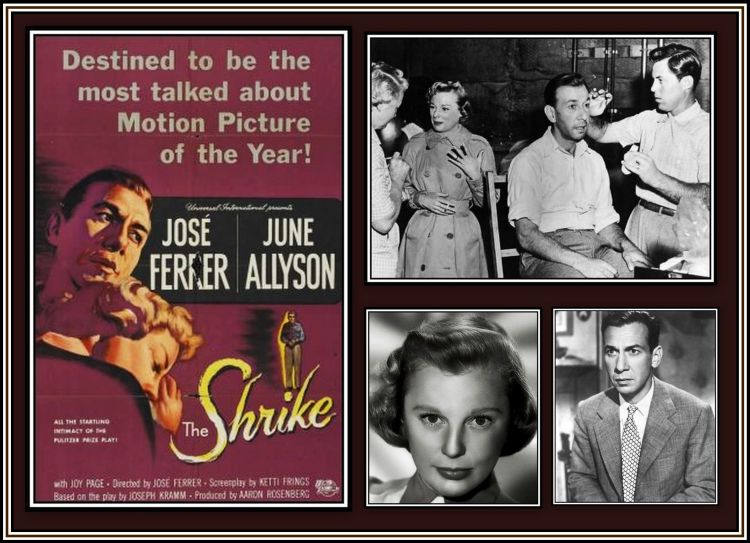 |
| |
Jose Ferrer was undoubtedly an interesting actor with an amazing ability to become the role. I had first seen him as the Dauphin in Joan of Arc and disliked him intensely. In retrospect, I was far too young to see Joan of Arc when it was first released, but I had fallen in love with Ingrid Bergman and begged to see it. Unfortunately, the film proved too much for me and we had to leave the cinema as I could not stop crying when Joan was mistreated. I also saw Mr. Ferrer as Toulouse-Lautrec in Moulin Rouge and as Cyrano de Bergerac, both of which I enjoyed. Naturally, I did not realize that both roles were played by the same actor who played the Dauphin. Again I did not recognize him in The Shrike.
I mention The Shrike here only as an introduction to something that my parents and I did whenever we went to the Excelsior on a Thursday night as a family. As I have said, my parents closed the pie ‘n’ mash shop on Thursday evenings and we went out. We generally went to either the Hackney Empire or to a cinema or occasionally to a theatre in the West End. On the occasions when we went to the Excelsior, we would end our evening by going to a small restaurant on the corner of Bethnal Green Road and Canrobert Street.
I loved this restaurant. Sadly I cannot remember its name, but I believe that it was owned by people from either Italy or Cyprus. One of the waitresses was always especially attentive to me, and I for my part, was greatly taken with her. She had long black hair and was very pretty. She wore a black dress with a white apron. I also remember that she wore a bright red nail polish and lipstick to match. Yes, I was very taken with her despite my age.
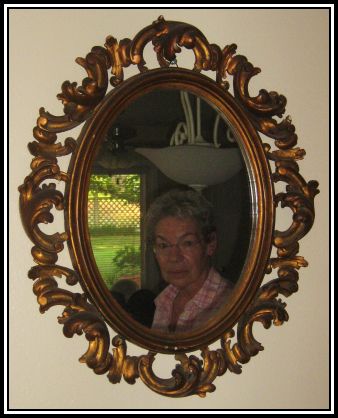 The décor of the restaurant was simple with walls painted in a dull yellow. The tables were round and covered with white tablecloths. On the tables were fresh cotton napkins that proved soft to the touch. In the centre of the ceiling was a large glass hanging chandelier. I remember that it reminded of those that I had seen in the theatres in the West End. However the centre piece of the décor was a huge oval-shaped mirror with an overly ornate gold frame, which hung on the far wall. The mirror covered most of the wall and was easily the largest that I had ever seen at that time. Naturally there was a table and seat that I preferred to sit at. From this vantage point, I could see everything that was going on in the restaurant without actually looking directly at anyone, something that my mother discouraged me from doing. I truly enjoyed myself, as I watched the goings on of the other patrons without their knowledge while I ate my late dinner. Although the cuisine was simple, I always found it to be delicious. I ate the same thing whenever I dinned there, Vienna Steak with peas and chips. Hardly haute cuisine, but at that age, I was more interested in eating the food that I liked rather than trying new things. The chips were a deep golden brown and were always crisp on the outside and soft on the inside. My father was also a creature of habit and ate fish. I remember asking him why he always ate fish whenever we went out. He told me that he ate it because he liked it. I turned my nose up since I was not overly fond of it at the time, much preferring meat. He smiled and said that when I was older, he was sure that I would develop a taste for it. This proved to be true. I have no memory what my mother ate. I remember that they served the meal with slices of bread and butter placed on a small plate to my left. I really enjoyed going to this restaurant and behaved very much in an adult manner, which no doubt endeared me to the other patrons and the staff. I seem to remember that my favourite waitress always brought me a little dessert prepared especially for me. I don’t ever recall leaving the restaurant to go home without receiving a kiss from her and a handshake from the owner. It is not surprising that I left that restaurant believing myself to be someone special! The décor of the restaurant was simple with walls painted in a dull yellow. The tables were round and covered with white tablecloths. On the tables were fresh cotton napkins that proved soft to the touch. In the centre of the ceiling was a large glass hanging chandelier. I remember that it reminded of those that I had seen in the theatres in the West End. However the centre piece of the décor was a huge oval-shaped mirror with an overly ornate gold frame, which hung on the far wall. The mirror covered most of the wall and was easily the largest that I had ever seen at that time. Naturally there was a table and seat that I preferred to sit at. From this vantage point, I could see everything that was going on in the restaurant without actually looking directly at anyone, something that my mother discouraged me from doing. I truly enjoyed myself, as I watched the goings on of the other patrons without their knowledge while I ate my late dinner. Although the cuisine was simple, I always found it to be delicious. I ate the same thing whenever I dinned there, Vienna Steak with peas and chips. Hardly haute cuisine, but at that age, I was more interested in eating the food that I liked rather than trying new things. The chips were a deep golden brown and were always crisp on the outside and soft on the inside. My father was also a creature of habit and ate fish. I remember asking him why he always ate fish whenever we went out. He told me that he ate it because he liked it. I turned my nose up since I was not overly fond of it at the time, much preferring meat. He smiled and said that when I was older, he was sure that I would develop a taste for it. This proved to be true. I have no memory what my mother ate. I remember that they served the meal with slices of bread and butter placed on a small plate to my left. I really enjoyed going to this restaurant and behaved very much in an adult manner, which no doubt endeared me to the other patrons and the staff. I seem to remember that my favourite waitress always brought me a little dessert prepared especially for me. I don’t ever recall leaving the restaurant to go home without receiving a kiss from her and a handshake from the owner. It is not surprising that I left that restaurant believing myself to be someone special!
Over the years, my fondness for the Excelsior grew. This mostly came from talking to my mother about the cinema once she came to live with me and from our watching the Excelsior films shown on television. Slowly, as a result of this, I began to realize that the Excelsior was a place of importance in my childhood. Although I still did not think of it as being somewhere special.
It was not until November 1993 that I learned that the cinema had been closed since August 1961 and demolished in 1969. I found the news both sad and annoying, as I would have liked to have known of the impending closure and demolition. I also was more than a little annoyed with myself. Why hadn’t I been back before to look at the place. What on earth was I doing in 1961 and 1969 that was so important? |
| |
 |
| |
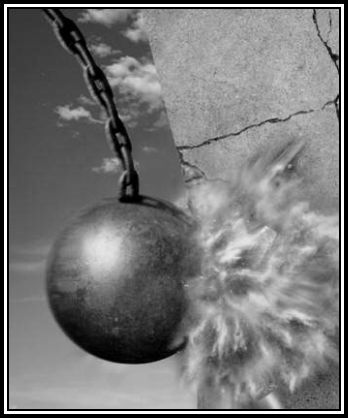 In 1961, I was enjoying School Holidays and thinking about taking Advanced Level G.C.E’s. By 1961, we had long since moved from Bethnal Green and it had been an age since I had been back. I had long since lost contact with earlier school friends, and by then, my family members had also moved away. There was little to attract me back to Bethnal Green. In August 1961, my friends lived in Slough and Langley and I was busy either studying or pursuing new interests that did not include anything related to the East End. The Excelsior, CinemaScope and the East End Markets had long since been lost in my memory. In 1961, I was enjoying School Holidays and thinking about taking Advanced Level G.C.E’s. By 1961, we had long since moved from Bethnal Green and it had been an age since I had been back. I had long since lost contact with earlier school friends, and by then, my family members had also moved away. There was little to attract me back to Bethnal Green. In August 1961, my friends lived in Slough and Langley and I was busy either studying or pursuing new interests that did not include anything related to the East End. The Excelsior, CinemaScope and the East End Markets had long since been lost in my memory.
By the time the wrecking ball was first swung at the Excelsior and bull-dozers entered to clear the site, I had already gone to and left University. I was now involved in research and living in Canada. The full impact of the loss and importance of the Excelsior did not hit me until my visit to the area with the hope to take some photographs for my mother in 1993. It was a shock when I turned the corner of Mansford Street and discovered that the Excelsior was gone and that the site was now a housing estate. I had returned a number of years too late to see the place one final time. I remember feeling sad and angry. My anger was directed at myself. Why hadn’t I taken an afternoon in 1961 or in 1969 to return to Bethnal Green and seen the place one last time? Naturally, as I walked away, I could see no reason why I hadn’t. Still, I soon realized that it was too late for self recriminations. I only hoped that my mother would not be too upset when I broke the news to her.
I don’t believe in regrets. One could spend one’s whole life remembering and regretting things in the past. The most useless of words are: If only ….. or perhaps …. What if …. Obsessing about things lost serves little purpose. We cannot return to the past. However, we are left with our memories. However, if only ….. for just one moment ….! |
| |
I would like to thank Mr. Kevin Wheelen for providing all photographs of the Excelsior used here. I am truly grateful to him for his kindness. |
| I would also like to express my sincere thanks to Ms Bona Starkeson for her kindness and help in the writing of this story, grazie mille! |
| |
|